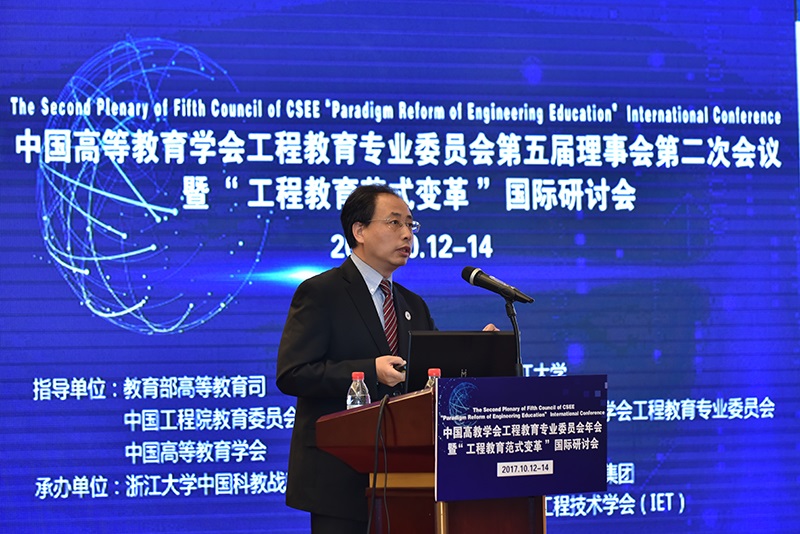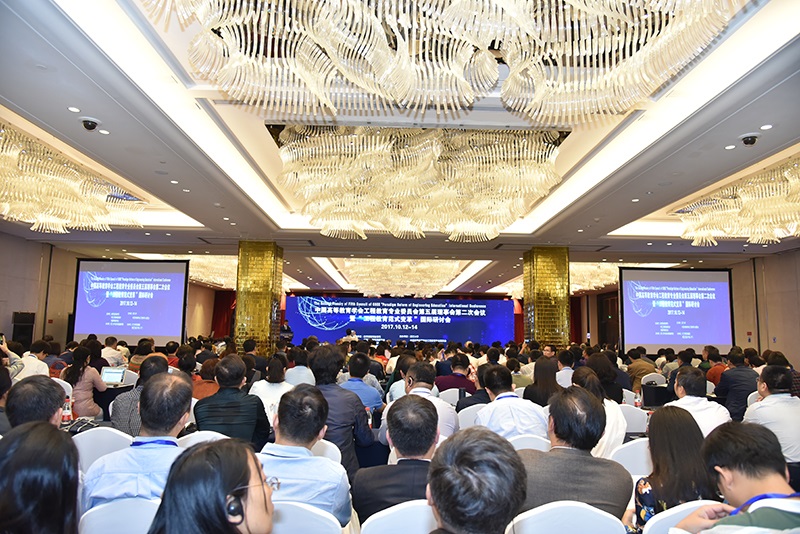
The Second Plenary Session of the Fifth Council of the Chinese Society of Engineering Education (CSEE) "Paradigm Reform of Engineering Education" International Conference was held at Zhejiang University from October 12 to 14. Wang Shuxin, Vice President of TJU and Vice President of CSEE hosted the conference. He delivered a keynote speech entitled “Road to transforming and upgrading traditional engineering disciplines in the new engineering paradigm”.
Wang introduced the new requirements for higher education and TJU’s history. His keynote speech encompassed three issues: new demands of industry and paradigm reform of engineering education, the new engineering paradigm and the structural adjustment of disciplines, and the way to transform and upgrade traditional engineering disciplines.
Wang pointed out that, from the perspective of the new demands of industrial development, a new concept in education and programing with students at its core is called for as the world has entered the age of intelligence, in which artificial intelligence will lead to industrial structural reform. In response to the new demands, the developed countries are expanding the scale of engineering education, adjusting the structure of talent in relevant fields and promoting education reform. At present, as China's economic development has entered a new phase and its higher education has stepped onto a new stage, there is a growing demand for paradigm reform in engineering education and for a large number of diversified and innovative talented people in this field to boost China’s industry and enhance its international competitiveness.
Wang systematically expounded the origin and construction of the new engineering paradigm and relevant research achievements at TJU. On April 8, the “Innovative Engineering Education Conference for Leading Engineering Universities” was held at TJU, charting a roadmap for constructing new engineering specialties, which was included in the Action Roadmap to Develop Innovative Engineering Disciplines. A new paradigm was mentioned in the Action Roadmap, and six proposals put forward: majors based on industrial demand, content of education based on technological development, teaching methods based on students’ interests, university development based on its needs, conditions creation based on resources at home and abroad, and standards based on international frontiers. According to the requirements of innovative engineering disciplinary development, the traditional paradigm of engineering education should be changed to a new one with a scientific structure.
Wang also pointed out that upgrading the structure of disciplines is a systematic project that was included in TJU’s World-class Undergraduate Education 2030 Action Plan. The new talent-cultivation system will be improved in the future to be geared to the needs of the world, the industry and the future. The discipline-oriented pattern will be transformed into an industrial-demand-oriented and interdisciplinary one. To this end, TJU will be innovate in its talent cultivation plans and educational methods, grasp the basic characteristics of talent and the core qualities of engineering talent, update the knowledge systems and foster an open, integrated and sustainable engineering education atmosphere.

The keynote speech aroused a strong reaction among the delegates. They agreed that TJU’s exploration and practice in innovative engineering disciplinary development is a good example to follow. Delegates from CSEE, other universities and the media had further discussions concerning the speech.
The conference was sponsored by China Association of Higher Education (CAHE) and the Chinese Society of Engineering Education (CSEE). Delegations from the Ministry of Education, the Chinese Academy of Engineering, Tsinghua University, UC Berkeley, The Ohio State University, Ecole Centrale de Nantes, ASEE, IET, Chinasoft International, among others, were also invited and delivered speeches.
By: Wu Jingjing, Wang Kai
Editors: Sun Xiaofang and Ross Colquhoun






